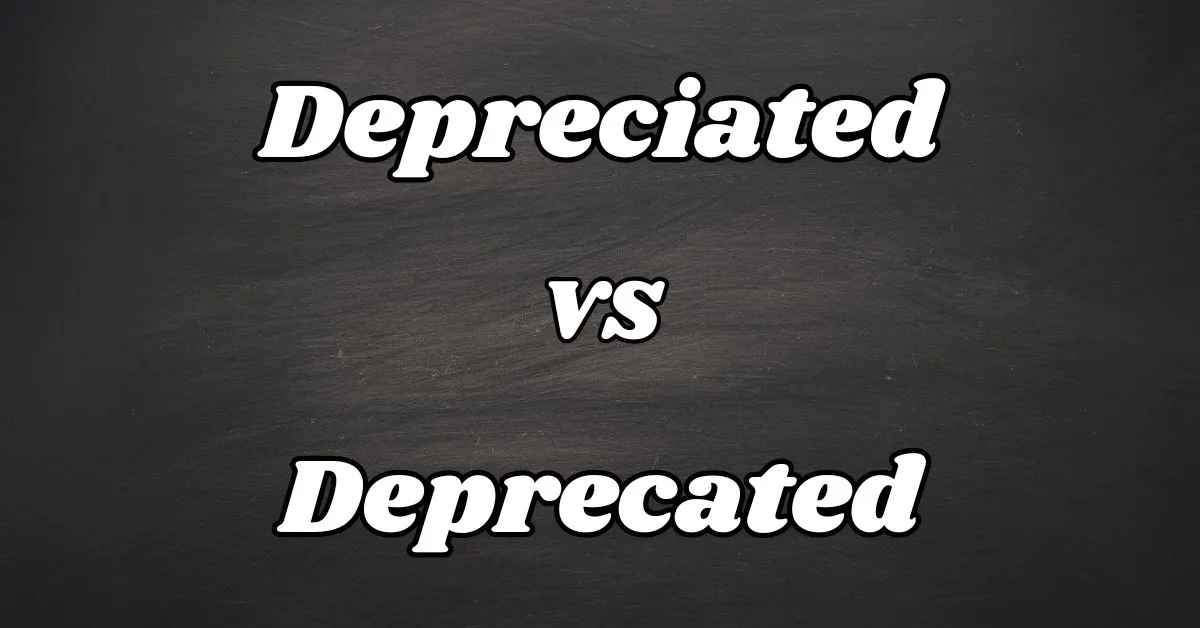Deprecated vs Depreciated: What’s the Difference often confuses. These similar-sounding words, however, have distinct meanings. Deprecated usually refers to software or features being phased out, while depreciated describes a decrease in value, often of assets.
This article comprehensively explores depreciated or deprecated, clarifying their distinct meanings and usage. We’ll delve into each word’s etymology, providing historical context. Examples will illustrate the difference between deprecate and depreciate.
We’ll examine deprecation and how it contrasts with depreciation. Understanding these terms is crucial for clear communication, especially in technology and finance. This exploration will help you confidently distinguish these words, improving your text processing and context analysis skills.
Quick Summary
The core difference between deprecated and depreciated lies in their application. Think of it this way: deprecated is for software features nearing retirement, while depreciated is for assets losing value.
A software feature can be deprecated, meaning it’s still functional but no longer recommended and may be removed in the future. On the other hand, a car depreciates over time. While they sound similar, their meanings are quite distinct.
Difference Between Deprecated or Depreciated
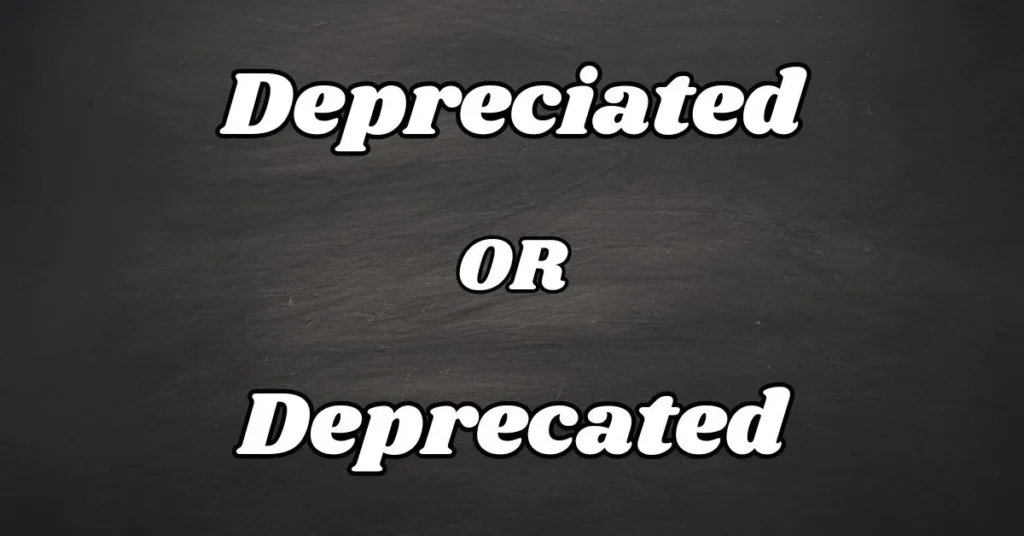
Deprecated signifies that something is being phased out or is no longer the preferred option. It’s commonly used in the tech world to describe software features, functions, or APIs that are still supported but are scheduled for removal in future updates.
Essentially, it’s a warning that the feature is on its way out. Depreciated, conversely, describes a decrease in value over time. This is a common concept in finance, where assets like cars, buildings, or equipment lose value due to wear and tear, age, or market fluctuations.
Understanding this difference is key to using these terms correctly.
Origins of the Word Depreciate
The word “depreciate” originated in the mid-15th century, meaning “to undervalue.” It comes from the Latin “depretiare,” combining “de-” (down) and “pretium” (price). By the 17th century, it evolved to mean “lessen the value of.”
The intransitive sense, “to fall in value,” emerged around 1790. Related forms include “depreciated” and “depreciating.” The term was also used from the mid-15th century onward.
Origins of the Word Deprecate
“Deprecate” appeared in the 1620s, initially meaning “to pray against.” It derives from the Latin “deprecari,” combining “de-” (away) and “precari” (to pray). This Latin root connects to the PIE root “*prek-,” meaning “to ask.” By the 1640s, its meaning shifted to “express disapproval.”
“Deprecated” and “deprecating” are related forms. The term also dates back to the 1620s.
Depreciate: Definition and Usage
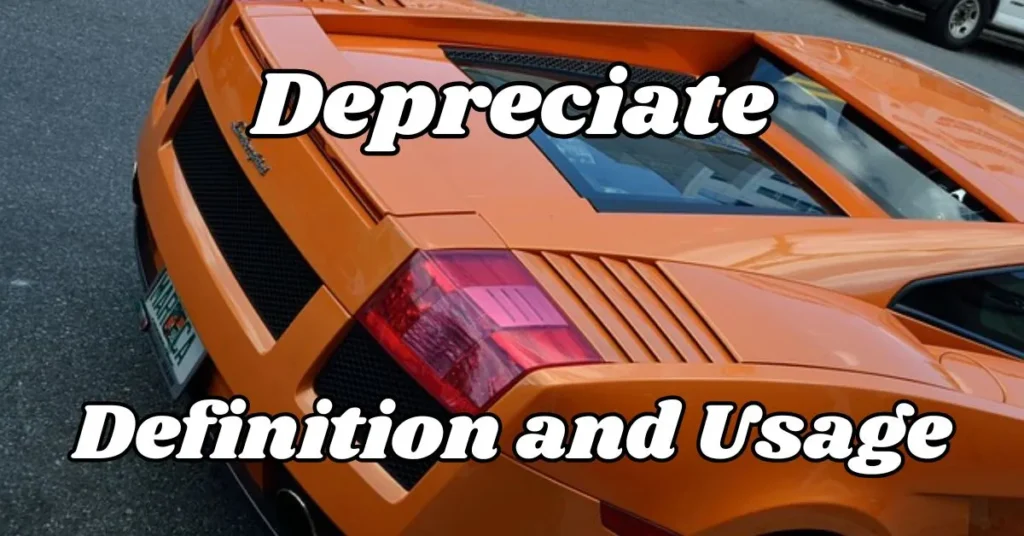
Depreciate definition: To diminish in value over some time. This often applies to physical assets like cars, machinery, or buildings due to wear and tear, age, or market fluctuations.
Depreciation is a key concept in accounting and finance, used to calculate the reduction in an asset’s worth over its useful life. Understanding depreciation is crucial for financial planning and investment decisions.
Depreciate definition
Depreciate means a reduction in value over time. This commonly applies to tangible assets such as cars, equipment, or real estate, due to factors like wear and tear, obsolescence, or market changes.
In accounting, depreciation systematically allocates the cost of an asset over its useful life. Understanding depreciation is crucial for financial reporting, tax calculations, and investment analysis.
Depreciate parts of speech
“Depreciate” primarily functions as a verb. While less common, it can sometimes be used as an adjective (e.g., “depreciating asset”) or within a compound noun (e.g., “depreciation schedule”). The verb form is the most frequently encountered usage.
Depreciate pronunciation
/dɪˈpriːʃiːeɪt/ The word is pronounced with the emphasis on the second syllable. A helpful way to remember it is to connect it to the idea of “price,” as in, the price is going down.
Uses of Depreciate in a Sentence:
- “My new car will depreciate significantly in the first few years.”
- “Accountants use specific formulas to calculate how assets depreciate.”
- “The value of the dollar can depreciate due to inflation.”
- “Real estate can depreciate or appreciate depending on market conditions.”
- “Antique furniture often doesn’t depreciate; it may even appreciate.”
Synonyms of Depreciate:
- Decline
- Decrease
- Diminish
- Reduce
- Fall
- Lessen
- Dwindle
- Weaken
- Deteriorate
- Lose value.
Deprecate: Definition and Usage
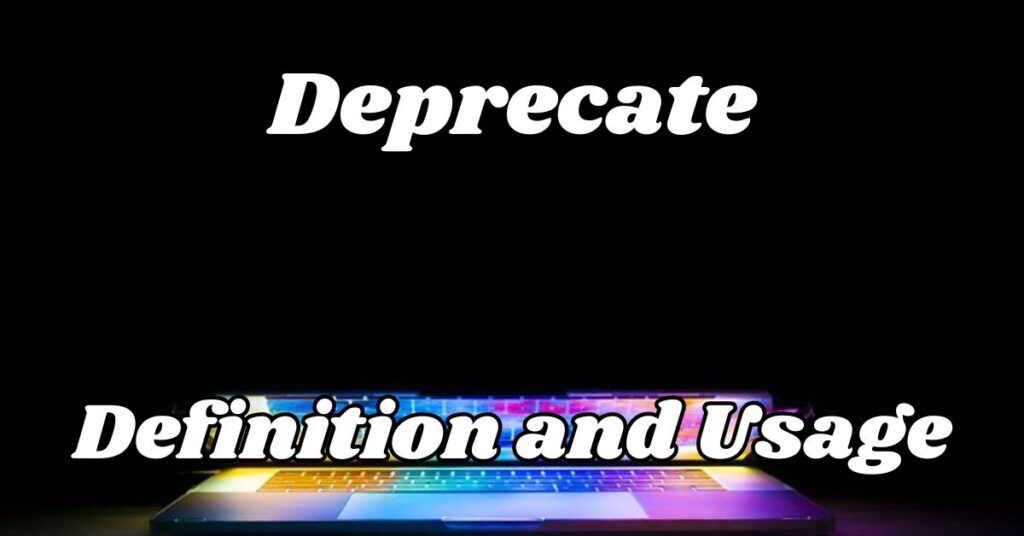
Deprecate definition: To express strong disapproval of something; to criticize or condemn. It can also mean to advise against something. This word conveys a sense of objection or discouragement. It is often used in discussions about ideas, actions, or behaviors.
Deprecate definition
Deprecate means to express strong disapproval or criticism. It signifies objecting to something, often an idea, action, or practice. Deprecating something implies a negative judgment and a desire for it to stop or be avoided.
Unlike “depreciate,” which relates to value, “deprecate” concerns attitudes and opinions.
Deprecate parts of speech
“Deprecate” functions exclusively as a verb. It describes an action of expressing disapproval. There are no common adjectival or noun forms of this word in standard English usage.
Deprecate pronunciation
/ˈdeprɪkeɪt/ The emphasis is on the first syllable. It’s useful to distinguish the pronunciation from “depreciate” to avoid confusion. Think “dep-ri-kate” to differentiate it.
Uses of Deprecate in a Sentence:
- “The critic deprecated the actor’s performance.”
- “The software company deprecated the old API.”
- “Many people deprecate the violence in video games.”
- “The manager deprecated the employee’s unprofessional behavior.”
- “I deprecate the idea of cutting funding for education.”
Synonyms of Deprecate:
- Disapprove
- Criticize
- Condemn
- Denounce
- Disparage
- Belittle
- Minimize
- Discount
- Object to
- Frown upon
Side by Side Comparison
| Feature | Depreciate | Deprecate |
| Meaning | Decrease in value | Express disapproval; advise against |
| Usage | Finance, accounting, economics | General usage, technology |
| Parts of Speech | Verb, (rarely) adjective, (in compounds) noun | Verb |
Everyday Usage Examples
Here are some examples of how “depreciate” and “deprecate” are used in everyday language:
- Depreciate: “My car depreciated by 20% in its first year.” “Real estate can both appreciate and depreciate.”
- Deprecate: “The critic deprecated the film’s unrealistic plot.” “I deprecate the use of such offensive language.”
Examples of Depreciate in Context:
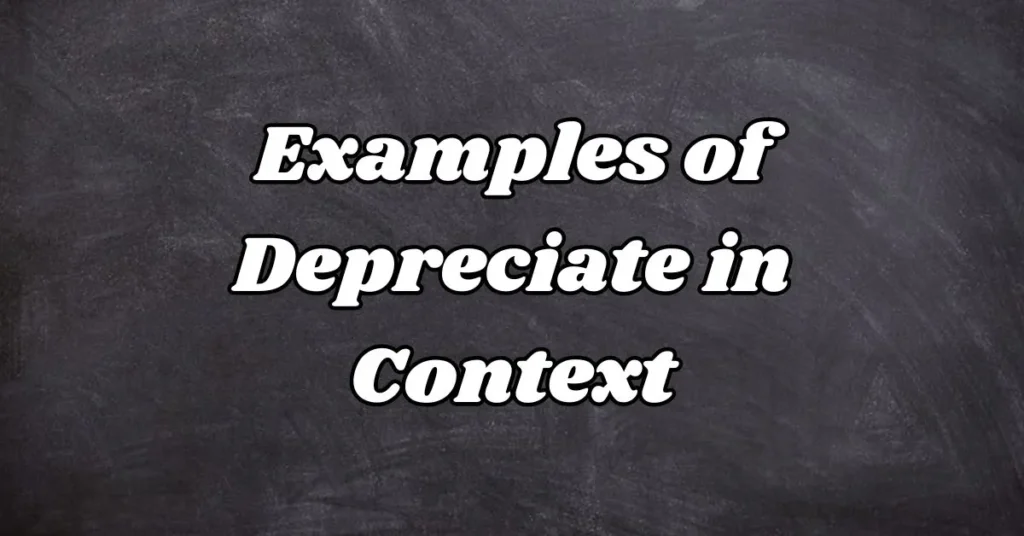
- “The house depreciated after the storm.”
- “My investments depreciated due to the market crash.”
- “The value of older technologies tends to depreciate rapidly.”
- “The accountant calculated the depreciation of the company’s equipment.”
- “Over time, all physical assets depreciate.”
Examples of Deprecate in Context:
- “The teacher deprecated the student’s disruptive behavior.”
- “The community leaders deprecated the proposed development project.”
- “The software developer deprecated the outdated code.”
- “I deprecate the use of harmful language.”
- “The reviewer deprecated the novel’s unrealistic plot.”
Tips to Remember the Differences
A helpful mnemonic is to associate depreciated with dollars (value) and deprecated with developers (software). This connection can make it easier to recall the correct usage.
Also, remember that deprecate often implies a conscious decision to move away from something, while depreciate is a natural process of value reduction.
More Article: Plural of Quail: Is it Quail or Quails
FAQS: Deprecated vs Depreciated
Is it a Deprecated or Depreciated Keyword?
“Deprecated” is the correct keyword when referring to software features being phased out. “Depreciated” is used for assets losing value.
Is Depreciated grammatically correct?
Yes, “depreciated” is grammatically correct as the past tense and past participle of “depreciate.”
What does deprecated mean in software?
In software, “deprecated” signifies a feature is no longer recommended and may be removed in future updates. It’s still functional but should be replaced.
Can deprecated still be used?
Yes, deprecated features often remain functional for a period, allowing developers time to transition. However, they may eventually be removed.
Conclusion
Understanding the difference between deprecated vs depreciated is crucial for clear communication. Deprecated refers to something, often in software, that is being phased out. Depreciated, on the other hand, describes a decrease in value, usually of an asset.
While the words sound similar, their meanings are distinct. Remembering this difference enhances both written and spoken communication, particularly in technical and financial contexts. By using these terms correctly, you avoid confusion and demonstrate a strong command of language.
Related Post: Targetted vs Targeted: What’s the Difference?

